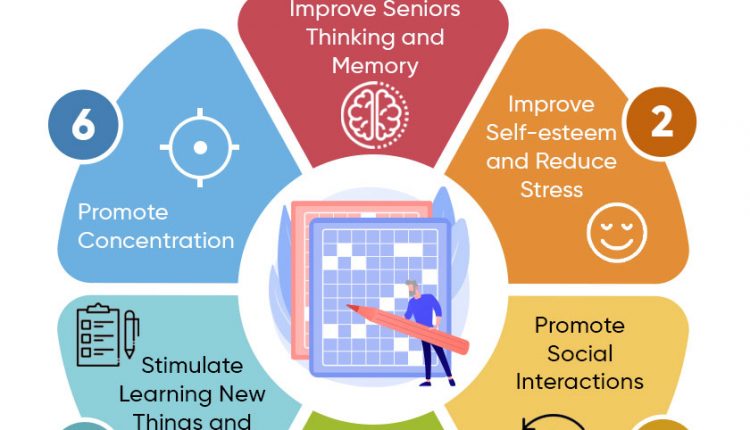
6 Reasons Why Word Games Must Become a Part of Seniors’ Daily Lives
Word games are a fun hobby that many people may enjoy. These games measure your vocabulary knowledge and your ability to use it successfully. People generally use word games as a source of entertainment. However, since they help with memory and boost seniors’ brain function, they are perfect tools to keep seniors mentally active. This article aims to provide helpful information about brain games, particularly word games, and list the most fun and productive word games for seniors to enjoy.
It is suggested that word games for seniors and puzzles are helpful for their mental ability, but is this true? Does practicing word puzzles and playing word games keep your mind “fit and active”? Will doing word puzzles and playing word-related games improve your memory and overall mental health?
How about we go on a journey with this article and set out for the truth?
Contents
What Are Word Games and What Do They Exactly Do?
Word games are board or electronic games that people play to test or investigate their qualities of language. Word games involves the use of language and vocabulary skills. These games can take many forms and can be played by people of all ages and skill levels.
Some popular examples of word games include crossword puzzles, Scrabble, Boggle, and word searches. In these games, players are typically given a set of letters or words and are asked to form new words using those letters or to find specific words hidden within a larger grid of letters.
People usually play word games for fun, but they can also be helpful for educational purposes. Young and senior people can have fun playing brain games like Hangman while mastering crucial linguistic skills like spelling.
By challenging memory capacities, word games may improve short-term memory.
Is It Possible to Improve Your Memory?
There are natural techniques to improve memory when disease and aging are not factors. Improving memory includes increasing the number of new connections between neurons in the memory-related areas of the brain.
Memory is one of the four fundamental brain systems. It is a cognitive function of the brain. Memory and processes such as focus and planning are vital for your brain’s cognition.
Your short-term memory, also known as “working memory,” drives decision-making and lasts about 20 seconds. If your brain determines that a piece of knowledge is important enough to keep for a while, it will store that piece in your long-term memory. This conversion begins in the hippocampus and progresses to the cortex, the brain region that holds memories. Long-term memories can last for hours or years, depending on how frequently these new connections are established (by repeatedly recalling or connecting them to other memories).
Benefits of Word Games for Seniors
Scientists have done several experiments on how brain games can boost cognitive function and promote memory in old age. Evidence shows that the positive effects of brain games, particularly word games, are the following:

1. Improve Seniors’ Thinking and Memory
Winning boosts the self-esteem of players. It is introductory psychology. Furthermore, word games play a stress-reducing role by attracting seniors’ attention and increasing their dopamine levels.
2. Improve Self-esteem and Reduce Stress
Remember the feeling of winning whenever you play! It boosts the self-esteem of players. Furthermore, word games play a stress-reducing role by attracting seniors’ attention and increasing their dopamine levels.

3. Promote Social Interactions
It’s best to play some word games like Hangman and Rhyming ball in groups. Group games can increase social interaction among seniors. It is clear that social connections in older adults lead to less depression and enhance their life quality.
4. Reduce the Risk of Dementia and Alzheimer’s
Having more social interaction and keeping the brain active are two essential factors that help prevent dementia and Alzheimer’s. Any activities that sharpen the senior’s brain promote cognitive function and lower the risk of these diseases.
5. Stimulate Learning New Information and Improve Vocabulary
Playing some word games involves telling stories and learning new words and expressions. Scientific findings have shown that learning further information (like a new language) can prevent or delay brain diseases.
6. Promote Concentration
In most games, you need an acceptable concentration level and focus on the subject to win. So playing word games that rely on your knowledge and language skills can be an excellent exercise to increase your attention span and stay focused.
7. Taking Care of Your Mental Well-Being
There must be an element of curiosity and fun for the brain to learn and pick up on new information. It’s easy to ignore how crucial it is for the brain to unwind, relax, and have fun. You may overlook its significance if you live an exceedingly stressful and busy life.
The most fantastic method to maintain a healthy and happy mentality is ensuring your brain gets a workout and has time to rest, repair, unwind, and have fun. All of these are possible by playing word games.
Top Word Games for Seniors
The good news is that such games, apart from improving memory, can also be one of the best hobbies for seniors. Moreover, today’s technology provides new opportunities for human health from physical and mental perspectives. Today several apps and games help with working memory seniors can enjoy.
The top 10 word games for seniors, including both analog and app, are as follows:
- Funnector
- Witty Words
- Rhyming ball
- Hangman
- Boggle
- Crossword puzzles
- Complete the saying
- Team stories
- Taboo
- Peak
- Wheel of fortune

Can Word Games Improve Memory?
The brain is a super complex organ. It comprises several parts, and the function of each piece has direct or indirect effects on other factors. Both brain experts and scientists have been trying to understand its mechanism for years. Some scientists claim that brain games can increase the cognitive function of seniors’ brains.
Cognitive decline can be associated with lower mental and physical health (like diabetes and depression), impaired daily decision-making, and increased healthcare costs. So, engaging in any activity, like brain games, especially word games that promote brain function, can be of great use.
There have been attempts to answer can word games improve memory? A scientific study on people aged 70-79 showed that a higher frequency of playing word games led to less cognitive decline. In addition, there has been evidence that word games can positively affect less intrusive memories after analog trauma (Hagenaars et al., 2017).
Struggling with Word Games?
Word games can be a fun way to test your language skills, but they can also be challenging. If you find yourself getting stuck and feeling frustrated, don’t worry – it happens to everyone. Luckily, there are tools available to give you a helping hand. One such tool is a word unscrambler, which can help you quickly identify words from jumbled letters.
Unscrambled Words is a great resource for word unscrambling. It offers a user-friendly and efficient unscrambler that can be used with a variety of games. You can unscramble words that begin or end with certain letters, or even sort them by length. With this tool, you can quickly identify words that you may have missed and gain an edge in your game.
So next time you find yourself struggling with a word game, remember that there are resources available to help you. Give a word unscrambler a try and see how it can elevate your game.

Generally speaking, the goal of playing word games should be their stress-relieving, fun, and social interaction benefits. Playing such games to improve brain function is not advisable since complex crossword puzzles can impair multitasking. We mean that the brain needs to relax and recharge time during playing! So, go easy on your brain and do word games for fun and leisure; a healthier brain function will follow as you play frequently.
Final Words
Word games are subclasses of brain training games. There is no solid evidence that such games help boost the cognitive function of a senior’s brain. However, due to the super complex nature of human brain mechanisms, they recommend doing word/brain games for fun.
Such games can increase seniors’ language and speaking skills and enhance social interactions. Furthermore, these games can increase brain activity, preventing Alzheimer’s and dementia. Several non-app and app word games are available today that seniors can enjoy.

It is true that some word games can prevent alzheimer’s disease or dementia. But can they slow down the process when the patient is already diagnosed with such diseases? What I mean is, can playing word games with seniors who has dementia help them in anyway?
Yes, I believe they can. It is an excellent form of brain exercise and entertainment at the same time. In fact, some studies show that patients who play word games or engage in similar activities do better than others.
I’m too skeptical about the whole idea of playing word games and improving memory; It’s great entertainment indeed. But I’m not sure if that works for everyone. I mean, if you have kept your mind active since childhood, you could have a better memory by playing word games. If that’s not the case, you have to work harder, like learning a second or third language or playing an instrument. Has anyone had any experience?
I think this can be a factor that helps memory function. It doesn’t mean that it works for all people in an exact way or to some degree. And it is undoubtedly great if other brain activation activities like learning a new language are used alongside playing such games.
Our brains are more complicated than we think. Even when we are not aware of it, it might be exercising. So it is not weird that playing word games can improve our brain function and memory. I’ve actually always found the concept reasonable.
I, for one, always enjoy word games. Scrabbles, boggle or the hangman. The best thing is, there are tons of word game apps, online and offline.
My grandkids play a fun word game called apples to apples. It includes red cards with people, places, and things, and green cards with two different descriptions. A player selects a description with a green card, and the other players must choose one from their hands of red cards. I sometimes play this game with them; it’s a great way to spend some quality time.